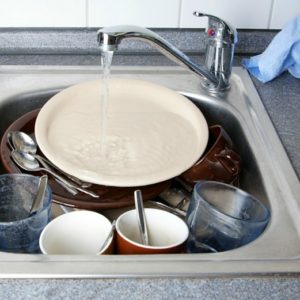Many of us are task-driven. We want to see things done, accomplished, finished. This is what the world tells us is productivity.

This can be supremely frustrating. It can be discouraging, disheartening, even depressing. But that is because we have the wrong framework for productivity and accomplishment and also a wrong idea of what the point of cleaning the house actually is.
I have been the queen of boom and bust cycles. There is no avoiding it. Maintenance – daily chipping away at the work, bit by bit, over and over – is the only way to avoid chaos and filth. It feels more productive to get into a cleaning frenzy and take a room from utter disaster to sparkling clean. But keeping a home is like tending a garden: its very nature is ongoing. And, like tending a garden, the best way to weed is when the weeds are young and small, to weed often, and to weed a little bit every time you go out to pick a tomato. Weeds breed weeds, so the longer they go, the harder the task becomes.
What if repeating ourselves was actually a way we imitate and image God?
We get all frustrated as if the necessity of repetition is part of our finiteness and fallenness, but when we look to Scripture, we see that even the infinite and perfect God delights in the repeating cycle of day and night, of seasons, of sustaining the world today in the same way as He has since the beginning. On top of that, we see that He repeats Himself to us, as well, giving us story after story, example after example, admonition after admonition, patient hearing after patient hearing.
Perhaps there is actually glory in repetition, if we had the eyes to see it.
All these little, trivial details often wear us down. But perhaps that is because we are operating under a false paradigm, one that does not see how much repetition (breath in, breathe out, breathe in, breathe out) is woven into existence itself.
If we want things all done, over, ended, is that not in a way wishing for death? Life is not only full of, but built with and upon, repeated actions and processes, change upon change.

Keeping house, tending to the needs of people, is one way we can reflect God and, in a small way, the Story that God Himself tells.
The fact that housework is repetitious, then, is actually an opportunity. If we are what we regularly do, then every day we have the opportunity to become a person who cares for her possessions, a person who serves others cheerfully, a person who offers hospitality to herself, her family, and her community by such simple acts as making beds, doing dishes, and cleaning bathrooms.
Every morning when we get up and make our beds, we are making a statement to ourselves: I am the sort of person to brings order from chaos, who cares for her environment, who beautifies what she touches. Every evening when we clean the kitchen after dinner, we are making those same statements again. Every time we perform any act of housework, this is what we are saying, what we are living.
Learning to love what must be done is not only 1) knowing what must be done, and 2) learning why it must be done, but also 3) feeling affection for and delight in the what and the why.
It is possible. It is worth it. You can do it.
It starts with a brain dump.

4 Comments